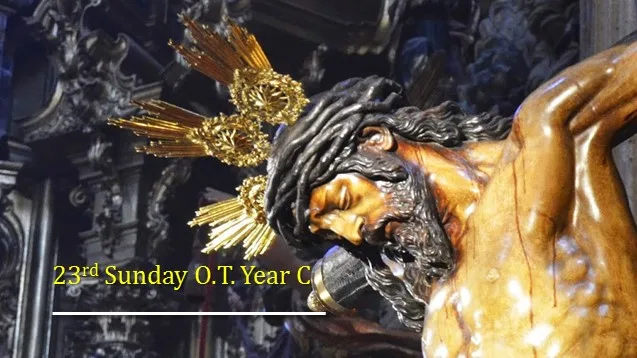Homily for the 23rd Sunday in Ordinary Time C
WHAT IS TRUE WISDOM?
Video Summary and text
WHAT IS TRUE WISDOM?
Video Summary and text

- The word “hate” towards our loved ones must not be interpreted literally. It must be understood, in the context of all our Lord’s teachings (cf. Lk 6:27.35). Using a hyperbolic expression, Our Lord simply reminds that when it comes to loving God, we cannot be half-hearted. God must take priority over everything, even above our own preferences, because it is the only way to fulfill His Will, convinced that God knows and wants the best for each one of us. As St. Gregory the Great comments:
“In this world let us love everyone, even though he be our enemy; but let us hate him who opposes us on our way to God, though he be our relative…. We should, then, love our neighbour; we should have charity towards all; towards relatives and towards strangers, but without separating ourselves from the love of God out of love for them” (In Evangelia homiliae, 37, 3).
- In the last analysis, it is a matter of keeping the proper hierarchy of charity: God must take priority over everything.
- These are “hard words. True, ‘hate’ does not exactly express what Jesus meant. Yet he did put it very strongly, because he doesn’t just mean ‘love less,’ as some people interpret it in an attempt to tone down the sentence. The force behind these vigorous words does not lie in their implying a negative or pitiless attitude, for the Jesus who is speaking here is none other than that Jesus who commands us to love others as we love ourselves and who gives up his life for mankind. These words indicate simply that we cannot be half-hearted when it comes to loving God. Christ’s words could be translated as ‘love more, love better,’ in the sense that a selfish or partial love is not enough: we have to love others with the love of God” (St. Josemaría, Christ is passing by, 97).
- When St. Thomas More was in prison waiting for his execution, he wrote to his daughter, Margaret saying:
- Obviously, this requires a daily struggle to give primacy to what God wants over what we want and “strive to please God rather than men, always ready to abandon everything for Christ (Vatican II, Apostolicam actuositatem) Rest assured that God gives us the grace to carry this out if we ask Him.
- When Eduardo Wojtyla (St. John Paul II’s brother) died in mysterious circumstances, Karol was just about to finish high school. Their mother died when Karol was just 9 years of age. Eduardo, who just finished medicine and landed a job in a hospital, was the hope to uplift the family’s financial condition.
- Helen Szcepanska, Karol’s teacher, recounts that, when she visited him in his home, she hugged him and said: “Poor Karol! You’ve lost your brother!”
- Karol serenely replied: “I accept God’s Will!”
- The woman commented: “I was confused because I realize that his faith was much more profound than mine.”
- The filial fidelity to God’s Will, however, is possible to the extent that, with faith, humility and prayer, man opens his conscience to the Lord and wants what Our Lord wants.
- This also includes fulfilling and respecting His Will for our brethren whom we must treat with dignity and receive with fraternal charity, as St. Paul recommends to Philemon to welcome the slave, Onesimus, as he would with St. Paul (2nd reading). For this, we must renounce our egoism out of love for God.
Mother Mary, pray for us so we could faithfully follow Your Son, Our Lord Jesus Christ!
Stay updated: subscribe by email for free TO OUR NEW WEBSITE www.catholicsstrivingforholiness.org (PUT YOUR EMAIL IN THE SUBSCRIBE WIDGET).
We are also in www.fb.com/Catholicsstrivingforholiness. Kindly help more people in their Christian life by liking our page and inviting your family, friends and relatives to do so as well. Thanks in advance and God bless you and your loved ones! Fr. Rolly Arjonillo